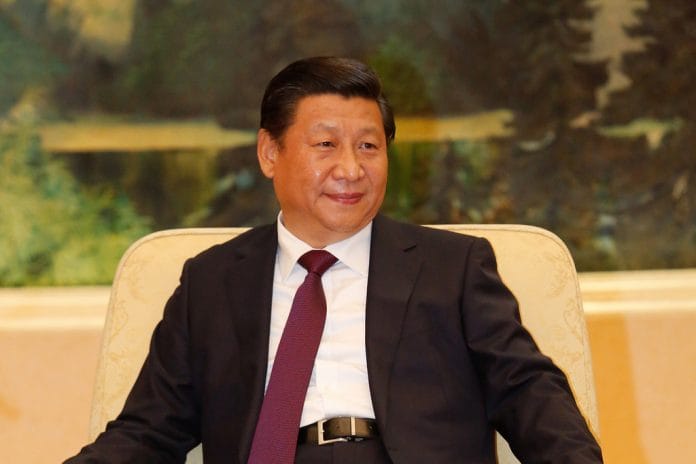A step closer to one-man rule
China just edged a step closer to one-man rule after Xi Jinping did not include a clear successor while unveiling the new line-up to the Communist Party’s Politburo Standing Committee, the party’s key decision-making entity, write Chun Han Wong and Jeremy Page in the Wall Street Journal. Beijing is indeed a step “closer to resurrecting one-man rule,” they write.
“The parade of the seven-man Politburo Standing Committee onto a red-carpeted podium in Beijing’s Great Hall of the People was the climax of a twice-a-decade process that placed Mr. Xi on par with Mao in the party constitution and positioned him as pre-eminent leader even beyond his second five-year term,” they write.
“Concentrating such power in Mr. Xi — who can now make policy and personnel choices virtually uncontested — draws to an emphatic end an era of collective leadership. It also represents a historic gamble.”
The unanticipated consequences of the Qatar boycott
The boycott of Qatar seems to be having some unanticipated consequences for its enforcers, says this piece in The Economist. Four months since Saudi Arabia, the UAE, Bahrain and Egypt closed their borders and cut diplomatic ties with Doha, they seem to be paying a steep price for it.
“The boycott is also hurting others across the Gulf, including some of the countries that imposed it. Particularly hard-hit is Dubai, a services hub for the region. Qatari firms that do business in the UAE all use local partners, and many are feeling the pain.”
“The blockade is also weakening the six-country Gulf Co-operation Council (GCC), of which Qatar, Saudi Arabia and the UAE are members. Although it was never much of a political union, it had at least allowed goods and people to move freely across borders. But the boycott has upended that.”
“It is also, ironically, rewarding the GCC’s biggest rival. Trade between Qatar and Iran was $98m last year. Iranian exports to Qatar grew by about 60% this summer. With Saudi airspace closed, scores of Qatar Airways flights now arc over Iran each day. The airline pays a hefty overflight fee for each one. ‘If the crisis goes on for years, we’re talking about hundreds of millions of dollars in new revenue for Tehran,’ says an economist in Dubai.”
The faults in the European project
“Today, the dream of European unity has begun to wither away, and the future stability of the Continent is clouded in uncertainty,” writes veteran U.S. journalist and think tanker William Drozdiak in “Fractured Continent: Europe’s crises and the fate of the West.” His observations are important because “Sometimes an outsider’s eye perceives symptoms of decay more clearly than those who live in the midst of Europe’s daily churn,” writes Paul Taylor in Politico EU.
“Compounding the crises, the former Washington Post foreign correspondent says the United States’ disengagement has left Europeans adrift where previously a steadying hand from Uncle Sam often helped navigate the Continent through troubled waters…He warns that, in the absence of strong American leadership, Europe risks being consumed by its old demon: nationalism,” Taylor writes.
“Drozdiak points to a deep-seated EU methodological problem: the habit of setting out to achieve ambitious objectives with half-baked plans forged in late-night compromises, without anticipating what would happen when things go wrong.”
Another showdown
A NAFTA showdown may fast be approaching, and far from being driven by economic realities, perceptions are being shaped by Trump’s unfounded political rhetoric, writes Robert J. Samuelson in The Washington Post.
“The trouble is that NAFTA actually isn’t a bad deal for the United States.
“Consider. Canada and Mexico are the first- and second-largest markets for U.S. exports. In 2015, these exports — counting both goods (such as computers) and services (such as tourism) — amounted to $600 billion. That’s more than a quarter of total U.S. exports and almost four times U.S. exports to China. Why would we want to attack our best foreign markets?”
“It’s a good deal for us and our partners. We all get more consumer choice. We all get more competition, which holds down prices. Jobs are created in all the countries. To be sure, some American jobs are lost, as factories move to Mexico. This is hard on the displaced workers, but so is competition that eliminates American jobs for other American jobs. Overall, benefits exceed costs.”
“Still, Trump seems determined to vilify Mexico and Canada. The facts say otherwise,” he concludes.
An election that could destroy Kenya
As Kenyans vote in a contentious presidential election rerun, the country’s President Uhuru Kenyatta has stated that people must be allowed to vote. The problem is that allowing people to vote could “generate a crisis beyond the capabilities of Kenyan institutions to resolve”, writes Maina Kiai in the Washington Post.
“Elections do not always reward those who think they should lead. Indeed, the true test of any democracy is not purely that citizens’ ballots are cast and counted — but that the will of the people is accepted and duly reflected in the government they choose. We cannot have it any other way,” Kenyatta has written.
Quite the opposite, the election could leave Kenya torn apart, writes Kiai. “The crisis is so bad that some opposition supporters are talking about secession and asking the electoral commission to consider a referendum that would split Kenya up. While the protests might lose some momentum, this discussion will not. Unfortunately, grievances long held by those excluded from power could make secession an attractive option.”






